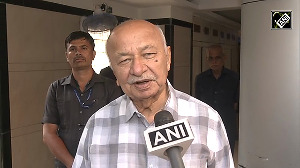Lashkar-e-Tayiba operative David Headley approached the Inter-Services Intelligence to help another co-accused in Mumbai attacks Tahawwur Rana to get back to Pakistan, according to a video recording produced by the Federal Bureau of Investigation before a court in Chicago on Monday.
Headley used his personal links to favour Rana, FBI agent Jeffrey Parsons said while deposing before the United States District Court during the 26/11 trial which resumed after a five day break.
Parsons said he had interviewed Pakistani-Canadian Rana with another agent Benabides. In the video shown in court, Rana said he thought LeT does not know Headley is with the ISI.
Parsons also said that Rana mentioned his meeting with al Qaida commander Ilyas Kashmiri. He is believed to have been killed in a US drone attack in south Waziristan last week.
Rana, 50, had served in the Pakistani Army as a doctor. He served in the Gulf War in Saudi Arabia and got injured there and recuperated in Germany. After that Rana was posted in the glacier region in Pakistan where he declined to go following which he was declared a deserter and was placed on the list of Absent Without Leave.
As a result, Rana could not travel to Pakistan again. "Headley used his personal links to get me the favour," the FBI agent quoted Rana as stating. During previous hearings Headley had testified that ISI was linked to the 2008 Mumbai terror strikes.
Rana's trial, which started on May 16 and was supposed to last till June 15, had been going faster than expected. If convicted, Rana faces a possible life sentence.
Headley spoke to Rana emotionally about Kashmir. There were also talks by Headley about a fight over who should control the land of Kashmir, Rana said in the video.
Rana also wanted to open immigration offices of First World Immigration in Europe and Australia, defence witness a lawyer from Canada David Alexander Hamilton Morrison testified.
For India business, Rana gave five advertisements in five prominent newspapers. US District Court Judge Harry D Leinenweber said the case had proceeded quickly partly because both the government and defence had no problems with the stipulation.
A stipulation is an agreement between opposing parties prior to a pending hearing or trial when both parties agree on certain aspects on which they do not argue. "We're fairly close to the end of the case," Leinenweber said during the last hearing.
Final arguments will take place on Tuesday and the verdict may come as early as June 8. Rana was indicted by a federal grand jury under 12 counts on February 15 last year for planning out the Mumbai attacks, providing material support to LeT to carry out the bombings, and guiding Headley in scouting targets in Mumbai in the process.
Rana, on the other hand, said that he was duped by Headley, who has pleaded guilty to scouting sites in Mumbai. On December 8, 2009, FBI additionally accused Headley of conspiring to bomb targets in Mumbai, providing material support to LeT and aiding and abetting the murder of US citizens in the 2008 Mumbai attacks.
Headley pleaded guilty to all charges on March 18, 2010. He faces life in prison and a $3 million fine when he is sentenced.
The government rested the case on Monday and defence witnesses were called. Computer forensic expert Yaniv Schiff Moshe said he searched Rana's computer from July 1, 2009 to October 15, 2009 and found no search for Jyllands Posten, Fleming Rose (Jyllands Posten cultural editor) or Kurt Westergaard, the cartoonist who drew the controversial cartoons of Prophet Muhammad.









 © 2025
© 2025